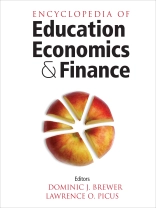Economics can be a lens for understanding the behavior of schools, districts, states, and nations in meeting education needs of their populaces, as well as for understanding the individual decisions made by administrators, teachers, and students. Insights from economics help decision makers at the state level understand how to raise and distribute funds for public schools in an equitable manner for both schools and taxpayers. Economics also can assist researchers in analyzing effects of school spending and teacher compensation on student outcomes. And economics can provide important insights into public debates on issues such as whether to offer vouchers for subsidizing student attendance at private schools. This two-volume encyclopedia contains over 300 entries by experts in the field that cover these issues and more.
Features:- This work of 2 volumes (in both print and electronic formats) contains 300-350 signed entries by significant figures in the field.
- Entries conclude with cross-references and suggestions for further readings to guide students to in-depth resources.
- Although organized in A-to-Z fashion, a thematic ‘Reader’s Guide’ in the front matter groups related entries by topic.
- Also in the front matter, a chronology provides students with historical perspective on the development of education economics and finance as a field of study
- The entire work concludes with a Resources appendix and a comprehensive Index.
- In the electronic version, the index, Reader′s Guide, and cross references combine to provide effective search-and-browse capabilities.
Key Themes:
- Accountability and Education Policy
- Budgeting and Accounting in Education Finance
- Education Markets, Choice, and Incentives
- Equity and Adequacy in School Finance
- Financing of Higher Education
- Key Concepts in the Economics of Education
- Private and Social Returns to Human Capital Investments
- Production and Costs of Schooling
- Revenue and Aid for Schools
- Statistical Methods in the Economics of Education
- Teachers and Teacher Labor Markets
Sobre el autor
Lawrence O. Picus is professor of education finance and policy at the Rossier School of Education at the University of Southern California. His current research interests focus on adequacy and equity in school finance as well as efficiency and productivity in the provision of educational programs for K-12 school children. Picus is past president of the Association for Education Finance and Policy (AEFP) and is the president of the board of Ed Source, a California-based education research organization. Picus is the coauthor of School Finance: A Policy Perspective (5th edition) with Allan R. Odden. He has authored, coauthored, or edited several other books including Where Does the Money Go? Resource Allocation in Elementary and Secondary Schools (1995), In Search of More Productive Schools: A Guide to Resource Allocation in Education (2001), Developing Community-Empowered Schools (2001) coauthored with Mary Ann Burke, and Principles of School Business Administration (1995) with R. Craig Wood, David Thompson, and Don I. Tharpe. He has also published numerous articles in professional journals. Picus studies how educational resources are allocated and used in schools across the United States. He has conducted studies of the impact of incentiveson school district performance. Picus maintains close contact with the superintendents and chief business officers of school districts throughout California and the nation and is a member of a number of professional organizations dedicated to improving school district management. He is a former member of the Editorial Advisory Committee of the Association of School Business Officials International, and he has served as a consultant to the National Education Association, American Federation of Teachers, the National Center for Education Statistics, and West Ed. He served as the principal consultant for the design of school funding systems in Wyoming and Arkansas and has conducted equity, adequacy, and resource allocation studies in Arizona, Arkansas, Washington, Vermont, Oregon, South Carolina, Louisiana, Kansas, Kentucky, Montana, New Jersey, Nebraska, Texas, North Dakota, Ohio, Wisconsin, and Maine. Picus holds a bachelor’s degree in economics from Reed College and master’s degrees from the University of Chicago and the Pardee RAND Graduate School. He received his Ph D in public policy analysis from the Pardee RAND Graduate School.












